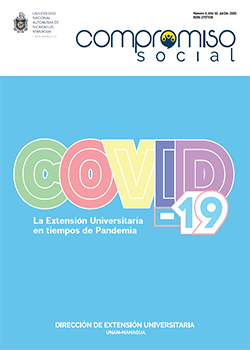Diagnóstico y Propuesta de Evaluación de las Clases en Línea en Educación Superior para Nicaragua y Honduras
DOI:
https://doi.org/10.5377/recoso.v2i4.13472Palabras clave:
Estrategias de evaluación, entornos virtuales, evaluación para los aprendizajes, tipos de evaluaciónResumen
En este texto se presenta como resultado de un estudio que tuvo como objetivo proponer alternativas o estrategias de evaluación en entornos virtuales en la educación superior para Honduras y Nicaragua, haciendo énfasis en cómo se evaluaba a través de entornos virtuales antes de la emergencia del COVID-19, cómo se encuentra el proceso, y hacia dónde va la evaluación en la educación del futuro. El estudio se realizó a través de una técnica de recolección de datos utilizando como instrumento la encuesta, la que fue aplicada a 74 docentes, obteniendo como resultado aportes significativos para la elaboración de la propuesta mediante la que se identificó que el 61% de los docentes considera que debe haber una combinación de evaluación sumativa (finalista con exámenes) y acumulativa por proceso. Con base en estos resultados se concluye que la educación que se brinde a los futuros profesionales debe estimular la creatividad e imaginación, fomentando la comunicación entre estudiantes y docentes desarrollo y crecimiento de este importante programa educativo.
1213
Descargas
Publicado
Cómo citar
Número
Sección
Licencia
Derechos de autor 2020 Universidad Nacional Autónoma de Nicaragua, Managua (UNAN-Managua)

Esta obra está bajo una licencia internacional Creative Commons Atribución-NoComercial-CompartirIgual 4.0.




